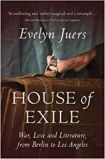House of Exile: War, Love and Literature, from Berlin to Los Angeles by Evelyn Juers
| House of Exile: War, Love and Literature, from Berlin to Los Angeles by Evelyn Juers | |
|
| |
| Category: Biography | |
| Reviewer: George Care | |
| Summary: An experimental collective memoir based around a range of intellectuals in exile, with central focus on Heinrich Mann and his much younger wife, Nelly. | |
| Buy? Yes | Borrow? Yes |
| Pages: 400 | Date: May 2011 |
| Publisher: Allen Lane | |
| External links: Author's website | |
| ISBN: 978-1846144615 | |
|
| |
Heinrich Mann and Nelly Kröger-Mann were in a constant state of hazardous exile after the rise of fascism in Germany in 1933. He became like Zola, his favourite author, a socially committed novelist and political activist and fierce critic of militarism. He was convivial, having a wide circle of friends that contained many creative artists, playwrights, socialists. He seemed drawn to the bohemians and the demi-monde. This elegant and sometimes formal gentleman came from the Hanseatic town of Lubeck where his father belonged to a renowned grain merchant family. These might be described as the haute-bourgeoisie. There was an unusual degree of sibling rivalry between him and his less robust brother, the famous author of The Magic Mountain, Thomas Mann. Hendrick possessed a sensual nature and fell passionately and easily in love with a number of women. Of these his relationship with Nelly, a fascinating woman, a seamstress and nightclub hostess, as full of contradictions as himself, was the most successful and long lasting. She followed him on the long painful journey into exile at first in Nice and later to the United States.
This is an unusual, demanding, yet important book, which is termed by its author a collective memoir, and portrays the attempts of a generation of writers and poets to continue their work in dark and terrifying times. Exile placed a severe stress on the community of authors across Europe, their dispersed families and friends. Jews and political activists, amongst others were to be viciously and systematically persecuted, tortured and executed by the Nazis and the heart-braking news appeared a tunnel of night to those exiled men and women who escaped from one country to another. Escapees were to be faced with the further eruption of civil war in Spain which lay in the path of their escape. Some were forcibly returned to their persecutors. The news of Stalin's tergiversations and show trials made the formation of a United Front harder still. Sensibilities of women, like those of Virginia Woolf or like gentle Nelly, who had early in her life suffered the traumatic loss of a child, were strained to the limits of their endurance.
The first part of House of Exile contains many moving and poetic passages. The writing, which has been compared with WG Sebald, is quietly dazzling and also reminiscent of the American novelist Andrea Barrett. A lyrical chapter concerns Heinrich's sister, Carla, of whom he was deeply fond. This darkly romantic actress encounters some Scandinavian biologists whilst transporting a skull in which she has concealed cyanide. Mention is made of nasturtiums which glow at dusk and we are given an exposition on Goethe who read Linneaus, as well as his beloved Shakespeare and Spinoza. The writing thus appeals on two levels: as prose poetry and simultaneously this illumines the literary and philosophical background. Goethe propounds the concept of Anschauung which maintains the importance of intuition as well as observation and can be expressed in English as the notion of the Gaze. Juers here is also exploring how the imagination works in reconstructing the past.
These were indeed dark times and, although Heinrich and Nelly found a temporary refuge in the South of France, the pressure of events mounted on both a personal and political level. Heinrich takes Veronal, an unreliable barbiturate to calm his nerves. Juers reminds us that despite these pressures he manages to keep working on his biography of Henry IV. There are interesting parallels between his difficult relationship with his brother, which is mirrored by Virginia Woolf, stoically sticking at her novels between headaches which forced her to take refuge in her bed and rather envying her artist sister, Vanessa, having her children. Family festivities maintain morale with copious quantities of champagne and Baumkukhen, even as troops march, dictators thunder, air raids threaten as does the internment of those unable to escape the gathering storm.
Although Freud and the stream of consciousness and historical novels are major themes in this work, it is difficult to tell if Evelyn Juers consciously intends the jump cuts in the later section to conveys the fractionated experience of these writers. The author has spent ten years in research. The result is an excellent introduction to intellectuals as varied as Joyce, Woolf and in particularly the Germans; Brecht, Döblin, Kafka, Walter Benjamin, Karl Schwitters and many, many others. It also describes the horrific realities of anti-semitism, mass aerial bombardment and consequent individual trauma. Juers is at her most moving in her depiction of the day to day harshness of life for women in exile and the personal cruelties dealt by fate and also men's unkindness to poor Nelly Kröger-Mann. She lost a child, her lover steals her story and destroys her manuscript and yet she transports him over mountains to escape, scrapes and scrimps to ensure their survival and is harassed by the FBI just as she was the brown-shirts. Finally she is constantly subjected to the snobbery of her brother-in-law. Little wonder she resorted to drink.
Exile literature is, of course ancient: By the rivers of Babylon, there we sat down, yea, we wept, when we remembered Zion. (Psalm 137). Classical authors such as Cicero and Ovid were subject to exile and the latter sang evocatively in the Tristia in elegiac couplets. Evelyn Juers' approach to imaginatively exploring this dark period of the European zeitgeist is striking; her innovative book, in its intensive exploration of the literary links of the German dissident writers from 1933 to 1945, known as exilliteratur, contributes a new dimension to the understanding of post-war, post-modern consciousness - the state of loneliness, isolation and apprehensiveness in the face of political and military forces that threaten the individual and those he loves.
I should like to thank Allen Lane, for providing a copy for The Bookbag.
Further reading suggestion: The Hare With Amber Eyes: A Hidden Inheritance by Edmund de Waal and Escape from the Nazis: The Incredible and Inspiring Saga of Two Young Jews on the Run in World War II Poland by Benjamin Mandelkern. You might also appreciate The First Bohemians: Life and Art in London's Golden Age by Vic Gatrell.
Please share on: ![]() Facebook,
Facebook, ![]() Twitter and
Twitter and
![]() Instagram
Instagram
![]() You can read more book reviews or buy House of Exile: War, Love and Literature, from Berlin to Los Angeles by Evelyn Juers at Amazon.co.uk Amazon currently charges £2.99 for standard delivery for orders under £20, over which delivery is free.
You can read more book reviews or buy House of Exile: War, Love and Literature, from Berlin to Los Angeles by Evelyn Juers at Amazon.co.uk Amazon currently charges £2.99 for standard delivery for orders under £20, over which delivery is free.
![]() You can read more book reviews or buy House of Exile: War, Love and Literature, from Berlin to Los Angeles by Evelyn Juers at Amazon.com.
You can read more book reviews or buy House of Exile: War, Love and Literature, from Berlin to Los Angeles by Evelyn Juers at Amazon.com.
Comments
Like to comment on this review?
Just send us an email and we'll put the best up on the site.


